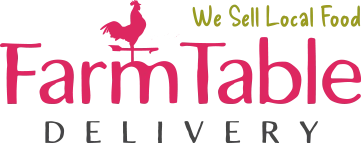Food Hubs Matter
Farm Table Delivery is a USDA-defined Food Hub that works to connect local foods to schools, restaurants, retailers, and household shoppers. Food Hubs work with a range of unconventional farmers, ranchers, and makers; from those still dreaming and testing the waters, those experiencing the glory of their first reorders, to those that have grown into regional mainstays and are looking to diversify their audiences for long-term sustainability.

Food hubs play a crucial role in supporting local agriculture, promoting sustainable agricultural practices, and increasing access to fresh, healthy food for all. Farm Table aggregates food to our warehouse, centrally located in Harlan, Iowa. We manage logistics such as transportation, storage, and handling, and marketing to buyers.
Farm Table works to keep local food moving.
To test products, grow their production capacity, and efficiently scale, allowing Producers to focus on their craft while reaching more markets.
Market Access: Hubs make it easy for small and emerging Producers to connect with a larger customer base, including restaurants, grocery stores, and families, increasing their sales quickly.
Distribution Support: Hubs manage the complicated logistics, cold chain transportation, and distribution of highly perishable produce and specialty products.
Technical Support: including guidance on market demands, best practices, marketing, packaging, technology, and compliance with regulations to improve marketability, efficiency, and productivity.
Restaurants, Retailers, and Household Shoppers benefit when a Hub intentionally sources products that meet their needs.
Easy Peasy: Farm Table sources from all types of Producers making it easy for you to have a one-stop shopping expereince, without added shipping expenses and multiple sign-ins.
Efficient Supply Chain: streamlining the supply chain, reducing transportation costs and time, ensuring fresher products reach customers in days, not weeks.
Fair Prices: provide transparent transactions, ensuring Producers receive equitable compensation for their products.
Reduced Risk: Hubs aggregate products from multiple producers, reducing the buyer’s risks related to market fluctuations and crop failures.
Technical Support and Managed Expectation: including guidance how to work with imperfect grading, micro crop and emerging producer realities, and menu planning,
Better land management, stewardship and biodiversity
Sustainable Practices: Heirloom Producers often prioritize sustainable and organic farming practices.
Better Products: Our Producers standout from the conventional with cleaner ingredients and solution-oriented recipes.
Safe Food Systems: Our local farmers and ranchers aren’t anonymous and they take their responsibility to you seriously.
Invests in the Future: Supporting decentralized farms today ensures there are farms here tomorrow. This is vital for food security as we continue to experience disrupted supply chains and an uncertain global future. Reliance on centralized systems is a threat to our future.
Healthy food is a right.
Food access
Farm-acy
Food Hubs support local economic development, helping to grow small and emerging businesses and contributing to the vitality of the micro, local, and regional economy.
Retains Jobs: Locally-owned businesses employ more people per unit of sales, and retain more employees during economic downturns than big-box retailers. National chains tend to decrease the number of jobs, automate tasks, and answer to stock-holders.
The Next Generation of Farmers and Ranchers: Conventional and commodity farming isn’t going away but the next generation of producers look to diversify their revenue options and make the land their own, in their own way.
Local Businesses Buy Local: Businesses spend money at local businesses including the local repair shops, bookkeeping services, building purchases and rents, banking, and more. We help create and retain jobs for your friends and neighbors and invest in the community.
